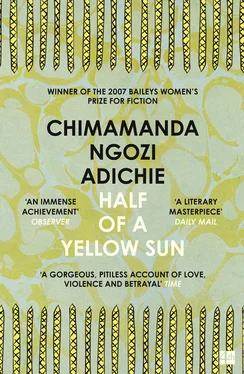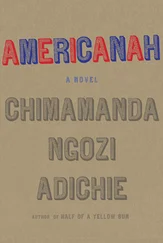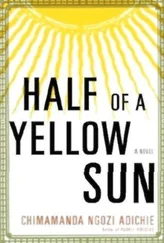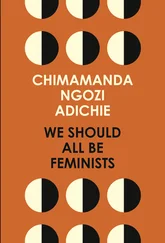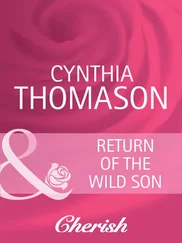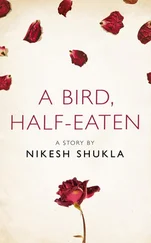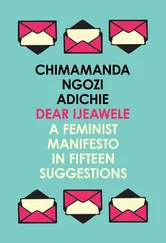The first time they met, Ugwu had greeted Jomo and Jomo nodded and continued to work, saying nothing. He was a small man with a tough, shrivelled body that Ugwu felt needed a watering more than the plants that he targeted with his metal can. Finally, Jomo looked up at Ugwu. ‘ Afa m bu Jomo ,’ he announced, as if Ugwu did not know his name. ‘Some people call me Kenyatta, after the great man in Kenya. I am a hunter.’
Ugwu did not know what to say in return because Jomo was staring right into his eyes, as though expecting to hear something remarkable that Ugwu did.
‘What kind of animals do you kill?’ Ugwu asked. Jomo beamed, as if this was exactly the question he had wanted, and began to talk about his hunting. Ugwu sat on the steps that led to the backyard and listened. From the first day, he did not believe Jomo’s stories – of fighting off a leopard barehanded, of killing two baboons with a single shot – but he liked listening to them and he put off washing Master’s clothes to the days Jomo came so he could sit outside while Jomo worked. Jomo moved with a slow deliberateness. His raking, watering, and planting all somehow seemed filled with solemn wisdom. He would look up in the middle of trimming a hedge and say, ‘That is good meat,’ and then walk to the goatskin bag tied behind his bicycle to rummage for his catapult. Once, he shot a bush pigeon down from the cashew tree with a small stone, wrapped it in leaves, and put it into his bag.
‘Don’t go to that bag unless I am around,’ he told Ugwu. ‘You might find a human head there.’
Ugwu laughed but had not entirely doubted Jomo. He wished so much that Jomo had come to work today. Jomo would have been the best person to ask about arigbe – indeed, to ask for advice on how best to placate Master.
He walked out of the compound, to the street, and looked through the plants on the roadside until he saw the rumpled leaves close to the root of a whistling pine. He had never smelt anything like the spicy sharpness of arigbe in the bland food Master brought back from the staff club; he would cook a stew with it, and offer Master some with rice, and afterwards plead with him. Please don’t send me back home, sah. I will work extra for the burnt sock. I will earn the money to replace it . He did not know exactly what he could do to earn money for the sock, but he planned to tell Master that anyway.
If the arigbe softened Master’s heart, perhaps he could grow it and some other herbs in the backyard. He would tell Master that the garden was something to do until he started school, since the headmistress at the staff school had told Master that he could not start midterm. He might be hoping for too much, though. What was the point of thinking about a herb garden if Master asked him to leave, if Master would not forgive the burnt sock? He walked quickly into the kitchen, laid the arigbe down on the counter, and measured out some rice.
Hours later, he felt a tautness in his stomach when he heard Master’s car: the crunch of gravel and the hum of the engine before it stopped in the garage. He stood by the pot of stew, stirring, holding the ladle as tightly as the cramps in his stomach felt. Would Master ask him to leave before he had a chance to offer him the food? What would he tell his people?
‘Good afternoon, sah – Odenigbo,’ he said, even before Master had come into the kitchen.
‘Yes, yes,’ Master said. He was holding books to his chest with one hand and his briefcase with the other. Ugwu rushed over to help with the books. ‘Sah? You will eat?’ he asked in English.
‘Eat what?’
Ugwu’s stomach got tighter. He feared it might snap as he bent to place the books on the dining table. ‘Stew, sah.’
‘Stew?’
‘Yes, sah. Very good stew, sah.’
‘I’ll try some, then.’
‘Yes, sah!’
‘Call me Odenigbo!’ Master snapped before going in to take an afternoon bath.
After Ugwu served the food, he stood by the kitchen door, watching as Master took a first forkful of rice and stew, took another, and then called out, ‘Excellent, my good man.’
Ugwu appeared from behind the door. ‘Sah? I can plant the herbs in a small garden. To cook more stews like this.’
‘A garden?’ Master stopped to sip some water and turn a journal page. ‘No, no, no. Outside is Jomo’s territory, and inside is yours. Division of labour, my good man. If we need herbs, we’ll ask Jomo to take care of it.’ Ugwu loved the sound of Division of labour, my good man , spoken in English.
‘Yes, sah,’ he said, although he was already thinking of what spot would be best for the herb garden: near the Boys’ Quarters where Master never went. He could not trust Jomo with the herb garden and would tend it himself when Master was out, and this way, his arigbe , his herb of forgiveness, would never run out. It was only later in the evening that he realized Master must have forgotten about the burnt sock long before coming home.
Ugwu came to realize other things. He was not a normal houseboy; Dr Okeke’s houseboy next door did not sleep on a bed in a room, he slept on the kitchen floor. The houseboy at the end of the street with whom Ugwu went to the market did not decide what would be cooked, he cooked whatever he was ordered to. And they did not have masters or madams who gave them books, saying, ‘This one is excellent, just excellent.’
Ugwu did not understand most of the sentences in the books, but he made a show of reading them. Nor did he entirely understand the conversations of Master and his friends but listened anyway and heard that the world had to do more about the black people killed in Sharpeville, that the spy plane shot down in Russia served the Americans right, that De Gaulle was being clumsy in Algeria, that the United Nations would never get rid of Tshombe in Katanga. Once in a while, Master would stand up and raise his glass and his voice – ‘To that brave black American led into the University of Mississippi!’ ‘To Ceylon and to the world’s first woman prime minister!’ ‘To Cuba for beating the Americans at their own game!’ – and Ugwu would enjoy the clink of beer bottles against glasses, glasses against glasses, bottles against bottles.
More friends visited on weekends, and when Ugwu came out to serve their drinks, Master would sometimes introduce him – in English, of course. ‘Ugwu helps me around the house. Very clever boy.’ Ugwu would continue to uncork bottles of beer and Coke silently, while feeling the warm glow of pride spread up from the tips of his toes. He especially liked it when Master introduced him to foreigners, like Mr Johnson, who was from the Caribbean and stammered when he spoke, or Professor Lehman, the nasal white man from America who had eyes that were the piercing green of a fresh leaf. Ugwu was vaguely frightened the first time he saw him because he had always imagined that only evil spirits had grass-coloured eyes.
He soon knew the regular guests and brought out their drinks before Master asked him to. There was Dr Patel, the Indian man who drank Golden Guinea beer mixed with Coke. Master called him Doc . Whenever Ugwu brought out the kola nut, Master would say, ‘Doc, you know the kola nut does not understand English,’ before going on to bless the kola nut in Igbo. Dr Patel laughed each time, with great pleasure, leaning back on the sofa and throwing his short legs up as if it were a joke he had never heard before. After Master broke the kola nut and passed the saucer around, Dr Patel always took a lobe and put it into his shirt pocket; Ugwu had never seen him eat one.
There was tall, skinny Professor Ezeka, with a voice so hoarse he sounded as if he spoke in whispers. He always picked up his glass and held it up against the light, to make sure Ugwu had washed it well. Sometimes, he brought his own bottle of gin. Other times, he asked for tea and then went on to examine the sugar bowl and the tin of milk, muttering, ‘The capabilities of bacteria are quite extraordinary.’
Читать дальше
